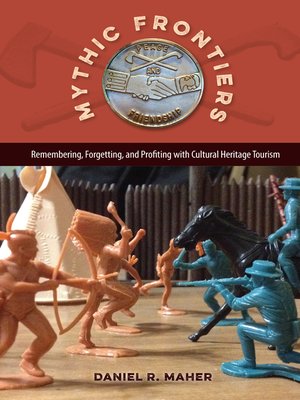Mythic Frontiers
ebook ∣ Remembering, Forgetting, and Profiting with Cultural Heritage Tourism · Cultural Heritage Studies
By Daniel R. Maher

Sign up to save your library
With an OverDrive account, you can save your favorite libraries for at-a-glance information about availability. Find out more about OverDrive accounts.
Find this title in Libby, the library reading app by OverDrive.



Search for a digital library with this title
Title found at these libraries:
| Library Name | Distance |
|---|---|
| Loading... |
"Maher explores the development of the Frontier Complex as he deconstructs the frontier myth in the context of manifest destiny, American exceptionalism, and white male privilege. A very significant contribution to our understanding of how and why heritage sites reinforce privilege."— Frederick H. Smith, author of The Archaeology of Alcohol and Drinking
"Peels back the layer of dime westerns and True Grit films to show how their mythologies are made material. You'll never experience a 'heritage site' the same way again."—Christine Bold, author of The Frontier Club: Popular Westerns and Cultural Power, 1880–1924
The history of the Wild West has long been fictionalized in novels, films, and television shows. Catering to these popular representations, towns across America have created tourist sites connecting such tales with historical monuments. Yet these attractions stray from known histories in favor of the embellished past visitors expect to see and serve to craft a cultural memory that reinforces contemporary ideologies.
In Mythic Frontiers, Daniel Maher illustrates how aggrandized versions of the past, especially those of the "American frontier," have been used to turn a profit. These imagined historical sites have effectively silenced the violent, oppressive, colonizing forces of manifest destiny and elevated principal architects of it to mythic heights. Examining the frontier complex in Fort Smith, Arkansas—where visitors are greeted at a restored brothel and the reconstructed courtroom and gallows of "Hanging Judge" Isaac Parker feature prominently—Maher warns that creating a popular tourist narrative and disconnecting cultural heritage tourism from history minimizes the devastating consequences of imperialism, racism, and sexism and relegitimizes the privilege bestowed upon white men.
"Peels back the layer of dime westerns and True Grit films to show how their mythologies are made material. You'll never experience a 'heritage site' the same way again."—Christine Bold, author of The Frontier Club: Popular Westerns and Cultural Power, 1880–1924
The history of the Wild West has long been fictionalized in novels, films, and television shows. Catering to these popular representations, towns across America have created tourist sites connecting such tales with historical monuments. Yet these attractions stray from known histories in favor of the embellished past visitors expect to see and serve to craft a cultural memory that reinforces contemporary ideologies.
In Mythic Frontiers, Daniel Maher illustrates how aggrandized versions of the past, especially those of the "American frontier," have been used to turn a profit. These imagined historical sites have effectively silenced the violent, oppressive, colonizing forces of manifest destiny and elevated principal architects of it to mythic heights. Examining the frontier complex in Fort Smith, Arkansas—where visitors are greeted at a restored brothel and the reconstructed courtroom and gallows of "Hanging Judge" Isaac Parker feature prominently—Maher warns that creating a popular tourist narrative and disconnecting cultural heritage tourism from history minimizes the devastating consequences of imperialism, racism, and sexism and relegitimizes the privilege bestowed upon white men.







